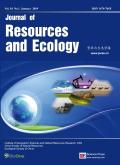Change of Agriculture Area Over the Last 20 Years: A Case Study of Nainital District, Uttarakhand, India
Q3 Environmental Science
引用次数: 0
Abstract
Abstract: This study performs the time series analysis of agriculture land in the Nainital District of Uttarakhand, India. The study utilizes Landsat satellite images for the classification of agriculture and non-agriculture land over a time duration of 21 years (2000–2021). Landsat 5, 7 and 8 satellites data have been used to classify the study area with Random Forest classifier. The Landsat satellite images are processed using the Google Earth Engine (GEE) platform. The selection of Random Forest classier has been based on a comparative analysis among Random Forest (RF), Support Vector Machines (SVM) and Classification and Regression Trees (CART). Overall accuracy, user accuracy and producer accuracy and Kappa coefficient has been evaluated to determine the best classifier for the study area. The overall accuracy for RF, SVM and CART for the year 2021 is 96.38%, 94.44% and 91.94% respectively. Similarly, the Kappa coefficient for RF, SVM and CART was 0.96, 0.89, 0.81 respectively. The classified images of Landsat in agriculture and non-agriculture area over a period of 21 years (2000–2021) shows a decrement of 4.71% in agriculture land which is quite significant. This study has also shown that the maximum decrease in agriculture area in last four years, i.e., from 2018 to 2021. This kind of study is very important for a developing country to access the change and take proper measure so that flora and fauna of the region can be maintained.近20年来农业面积的变化——以印度北阿坎德邦奈尼塔尔区为例
摘要:本研究对印度北阿坎德邦奈尼塔尔区的农业用地进行了时间序列分析。该研究利用陆地卫星图像对21年(2000-2001年)的农业和非农业用地进行分类。利用陆地卫星5号、7号和8号卫星的数据,用随机森林分类器对研究区域进行了分类。陆地卫星图像是使用谷歌地球引擎(GEE)平台处理的。随机森林分类器的选择是基于随机森林(RF)、支持向量机(SVM)和分类与回归树(CART)之间的比较分析。对总体准确度、用户准确度、生产者准确度和Kappa系数进行了评估,以确定研究区域的最佳分类器。2021年RF、SVM和CART的总体准确率分别为96.38%、94.44%和91.94%。类似地,RF、SVM和CART的Kappa系数分别为0.96、0.89和0.81。21年(2000-2021)农业和非农业地区的陆地卫星分类图像显示,农业用地减少了4.71%,这是非常显著的。这项研究还表明,农业面积的最大降幅是过去四年,即2018年至2021年。这种研究对于发展中国家了解变化并采取适当措施以维护该地区的动植物群非常重要。
本文章由计算机程序翻译,如有差异,请以英文原文为准。
求助全文
约1分钟内获得全文
求助全文
来源期刊

Journal of Resources and Ecology
Environmental Science-Ecology
CiteScore
2.40
自引率
0.00%
发文量
107
 求助内容:
求助内容: 应助结果提醒方式:
应助结果提醒方式:


